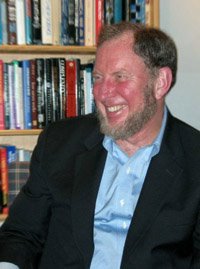Old Schmoozers and Machers

I’m reading Robert Putnam’s book, Bowling Alone, which argues that participation has declined in America. I’ll blog on that question after I’ve finished the book, but right now what fascinates me is his use of two Yiddish words that I hadn’t known before. A macher is someone whom I’d have called an activist — a person who participates in formal organizations that make things happen in society. Machers “follow current events, attend church and club meetings, volunteer, give to charity, work on community projects, give blood, read the newspaper, give speeches, follow politics, and frequent local meetings.”
A schmoozer, on the other hand, is someone who has an active but informal social life. As Putnam (see photo) describes them, schmoozers “give dinner parties, hang out with friends, play cards, frequent bars and night spots, hold barbecues, visit relatives, and send greeting cards.” Of course, some people are neither machers nor schmoozers, but don’t spend much time with others at all, whereas a few outgoing people manage to excel at both kinds of activity. In general, however, machers tend to be better educated and more affluent than schmoozers. In the past especially, and even to some extent today, more males were machers and more females were schmoozers. Women, for example, send out the vast majority of greeting cards– and nowadays they spent more of their computer time sending e-mails than men do.
Not knowing any Yiddish, I would have described this distinction as a contrast between civic and private social engagement. And, like Putnam, whereas I see both as rewarding aspects of life, I admire civic participation more than the alternative. That is how people address social and political problems, including the environment, energy, foreign policy, and the reform of social institutions such as health care or the criminal justice system. One is obliged to be a macher, if one can.
Putnam is concerned with showing the trends over time, claiming that both machers and schmoozers are becoming less active. Some other sociologists (especially Barry Wellman) question many of his conclusions, but the trends are not what interest me at the moment. Instead, I’m struck by the finding that these two orientations usually change during the life cycle. As an old person, that fact bothers the heck out of me. Putnam writes,
“Formal community involvement is relatively modest early in life, peaks in late middle age, and then declines with retirement. Informal social involvement follows the opposite path over the life cycle, peaking among young adults, entering a long decline as family and community obligations press in, then rising again with retirement and widowhood. Single people spend more time and energy in schmoozing.”How depressing! But, damn it, he’s right. To some extent those changes inevitably occur during the life cycle. When people marry and settle down, their new situation spurs them to get active in, say, school board affairs or their political party. However, the subsequent shift toward private affairs is not inevitable, and it’s disappointing to see perfectly competent old people disengage from public life. Many of my friends are retiring and retrenching to concentrate on private, informal social relationships with their families. Just when they have enough time (and should have enough wisdom) to contribute more in public affairs, they actually cut back their civic engagements.
I have a theory that it does not happen as much in California as in Toronto, which is why I came here for the winter. I spent last evening with a woman friend whom I hadn’t seen for twenty years. We’re both grayer now, but discovered with pleasure that we’re both still keen on fixing society. We intend to remain machers as long as possible. We have more physical infirmities and memory lapses than before, but those are trivial obstacles so long as we can avoid becoming predominantly schmoozers. Thanks, Robert Putnam, for today’s Yiddish lesson.

0 Comments:
Post a Comment
<< Home